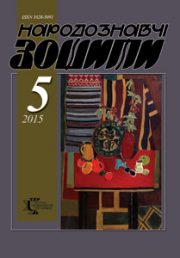The Ethnology Notebooks. 2017, 6 (138), 1307—1322
UDK 728:72.012/.02(477.8222)
DOI https://doi.org/10.15407/nz2017.06.1307
Received 11.06.2017
ORCID ID: https://orcid.org/0000-0002-1900-8948
Radovych Roman Bohdanovych, Ph.D in History, research fellow
at the Department of Historical Ethnology
of the Institute of Ethnology
of the National Academy of Sciences of Ukraine.
Svobody Avenue, 15, Lviv, 79000, Ukraine.
Contacts: Tel. (067)7117846; e-mail: ina@mail.lviv.ua
Abstract. In the proposed work features of housing construction culture on the territory of Manevychi district of Volyn region are considered. The specifics of building materials, technology and technology of wall construction, peculiarities of the formation of a ceiling, roof, heating system, etc. have been characterized. The localization of these phenomena has been carried out, as well as features common to the housing of the Western and Middle Polissia is allocated.
Keywords: Polissia, housing, planning, building technique, roof, ceiling, heating system.
REFERENCES
Archive of the LMNAP. F. Materialy ekspedytsij. Spr. ZV-68. [in Ukrainian]
Archive of the Institute of Ethnology of the National Academy of Sciences of Ukraine. F. 1. Op. 2. Spr. 638. [in Ukrainian]
Blomkvist, Je. (1956). Krest’janskie postrojki russkih, ukraincev i belorussov (poselenija, zhilishha i hozjajstvennye stroenija). Vostochnoslavjanskij jetnograficheskij sbornik: Ocherki narodnoj material’noj kul’tury russkih, ukraincev i belorusov v XІX — nachale XX v. (pp. 3—458). Moskva: AN SSSR. [in Russian]
Valencova, M. (2009). Kislyj — presnyj. In N.I. Tolstoj (Ed.), Slavjanskie drevnosti: etnolingvisticheskij slovar’ (Vol. 2, pp. 499—500). Moskva: Mezhdunarodnye otnoshenija.[in Russian]
Hlushko, M. (2012). Pokhodzhennia ta dzherela vchynenoho khliba v ukraintsiv (kul’turnohenetychnyj aspekt). The Ethnology Notebooks, 1, 3—18. [in Ukrainian]
Gracianskaja, N.N. (1968). Vvedenie. Tipologija narodnogo zhilishha v stranah zarubezhnoj Evropy. In N.N. Gracianskaja, N.M. Listova & S.A. Tokarev, Tipy sel’skogo zhilishha v stranah zarubezhnoj Evropy (pp. 3—11). Moskva: Nauka. [in Russian]
Danyliuk, A. (2002). Narodna arkhitektura Volyns’koho Polissia. Rivne: Volyns’ki oberehy. [in Ukrainian]
Ziubrovs’kyj, A. (2016). Prisnyj khlib u povsiakdennomu ratsioni ukraintsiv pivdenno-zakhidnoho istorykoetnohrafichnoho rehionu v kintsi ХІХ — seredyni ХХ st.: areal’no-khronolohichna kharakterystyka. The Ethnology Notebooks, 4, 804—816. [in Ukrainian]
Kutel’makh, K. (2001). Rusalky v povir’iakh polischukiv. Zapysky Naukovoho tovarystva imeni Shevchenka: Pratsi Sektsii etnohrafii i fol‘klorystyky,242, 87—153. [in Ukrainian]
Radovych, R. (2014). Polis’ka pich: spetsyfika formuvannia opichchia. The Ethnology Notebooks, 2, 270—291. [in Ukrainian]
Radovych, R. (2013). Rozvytok systemy opalennia polis’koho zhytla: sposoby vidvedennia dymu. The Ethnology Notebooks, 2, 212—230. [in Ukrainian]
Radovych, R. (2009). Tradytsijne zhytlo (budivel’nyj material, tekhnika ta tekhnolohiia, osoblyvosti planuvannia). In V. Koval’chuk (Ed.), Etnokul’tura Rivnens’koho Polissia (pp. 17—28). Rivne. [in Ukrainian]
Radovych, R. (1998). Pidbir ta zahotivlia budivel’noi derevyny na Pravoberezhnomu Polissi. The Ethnology Notebooks, 1, 54—65. [in Ukrainian]
Radovych, R. (2012). Tradytsijne zhytlobudivnytstvo Zakhidnoho Polissia (osoblyvosti ta dynamika rozvytku). Visnyk L’vivs’koho universytetu, 47, 68—110. [in Ukrainian]
Radovych, R. (2016). Dopomizhni tekhnolohichni zasoby dlia zabezpechennia mekhanichnykh ta teplotekhnichnykh vlastyvostej zrubu polis’koho zhytla: osoblyvosti ta dynamika rozvytku. The Ethnology Notebooks, 2, 308—318. [in Ukrainian]
Radovych, R. (2015). Khlibna dizha v inter’ieri polis’koho zhytla. The Ethnology Notebooks, 5, 1045—1053. [in Ukrainian]
Silets’kyj, R. (1999). Systema opalennia narodnoho zhytla polischukiv (typy opaliuval’nykh prystroiv, ikh konstruktyvni osoblyvosti, zvychai ta povir’ia). Polissia Ukrainy: materialy istoryko-etnohrafichnoho doslidzhennia (Vol. 2, pp. 125— 140). L’viv: Instytut narodoznavstva NAN Ukrainy. [in Ukrainian]
Taranushenko, S. (1969). Davnie polis’ke zhytlo. Narodna tvorchist’ ta etnohrafiia, 1, 8—23. [in Ukrainian]






